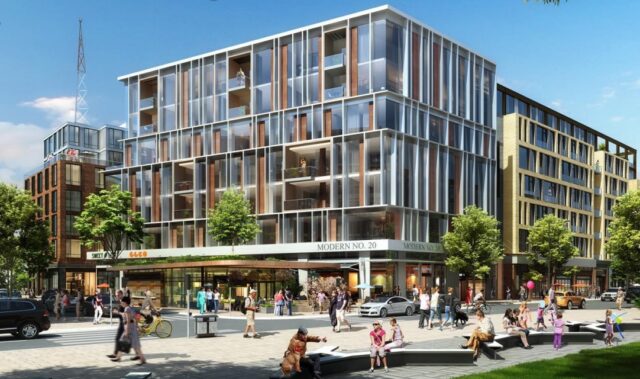
Calls by politicians, from Boston Mayor Marty Walsh to Vermont senator and presidential candidate Bernie Sanders, for businesses to spend billions building affordable housing are nothing but a dodge.
Here’s one nifty new California trend that’s made its debut here in the Bay State: Blaming tech giants for driving up home prices and rents and then squeezing them for billions to help fix a problem not of their creation.
All that cash Google, Apple and other tech behemoths are pledging towards new housing in the astronomically pricey Bay Area has caught the eye of Boston Mayor Marty Walsh.
Mayor Marty is apparently working on his own squeeze play scaled, of course, to the Massachusetts market, with hopes of getting Boston-area corporate bigwigs to fork over a cool $100 million for his recently unveiled, half–billion-dollar affordable housing initiative.
It’s easy to see the temptation. Money donated by the corporate sector is effectively fee money for elected officials, who are spared the painful alternative of hitting up constituents for new taxes and fees.
Yet while it might seem innocuous – after all, Greater Boston’s tech and drug giants would certainly seem to have money to burn – it is anything but.
A Confused, Left-Wing Attack
By hitting up the corporate sector for housing money, Walsh and other elected leaders, unwittingly or not, are buying into the idea, popular on the left, that tech companies and other big corporations should share the blame for the housing crisis.
That misplaced anger is on full display in California, where protestors in the Bay Area have hurled rocks at shuttle buses full of tech workers, raging at them for driving up home and condo prices and rents.
Bernie Sanders gave a prominent voice to this belief recently when he blasted Apple and other for supposedly trying to gloss over their supposedly central role in California’s crushingly high real estate costs by pledging billions of dollars to housing construction.
Business leaders, put away your checkbooks and instead get on horn, as well. Let local officials know you are fed up with their housing shenanigans which, after all, are hurting your employees and hindering your recruitment efforts.
It’s not that Sanders has a problem with sticking up tech companies and other companies for supposedly ruining the housing market, though how he thinks they did this is not entirely clear.
By being too successful – or, in Bernie–speak, by greedily “raking in profits” – and then pillaging the community by hiring too many employees? For not including a new, company-paid–for home or apartment in every employee’s benefits package?

The real villains of the housing crisis are not successful companies that hire large numbers of employees, but residents of towns like Newton which fight sensible housing developments like Northland’s latest project, above. Image courtesy of Cube 3 Architects
Asking Companies Dodges the Problem
Here’s the problem: While money for affordable housing is hardly a bad thing, launching a drive to get the business community to “step up” is a dangerous red herring.
It diverts attention from the real source of the problem, NIMBY opposition to new housing and stifling local zoning and building regulations here and in many other areas across the country.
Massachusetts needs hundreds of thousands of new houses, condos and apartments over the next several years, mostly in Greater Boston, just to keep up with current growth.
California faces an even more massive housing deficit, a whopping 3.5 million units.
The cause of the shortage, however, is not Google hiring too many workers in the Bay Area or Novartis expanding too rapidly in Kendall Square, but rather the opposition to new housing on part of both local officials and residents.
Even as Boston’s mayor looks to raise as much as $100 million from the local business community for his affordable housing initiative, Newton residents are fighting tooth and nail keep the construction of new housing to a minimum.
City councilors in Newton approved plans for a mixed-use complex with 800 apartments on an underused suburban tract next to a major business district after a long and contentious debate.
You could probably build a lot more housing than that on the 20-acre site, but even 800 units is apparently too much for RightSize Newton, which is gathering signatures for a referendum campaign to repeal the approvals.
Marty, Take the Gloves Off
Instead of hitting up companies for donations, Walsh, whose administration has given a green light to more than 30,000 new condominiums and apartments, should consider a radically different approach.
Mayor Marty: It’s time to take off the gloves and ramp up the pressure on you suburban counterparts. Tell them you can’t do it alone, that you refuse to do it alone anymore.
And business leaders: Put away your checkbooks and instead get on horn, as well. Let local officials know you are fed up with their housing shenanigans which, after all, are hurting your employees and hindering your recruitment efforts.

Scott Van Voorhis
For let’s get one thing straight, here. Businesses aren’t the villains here.
Rather, companies like Novartis, Google and Microsoft are the victims, along with the rest of us, of a housing market gone haywire.
And the culprits are none other than short-sighted elected officials in the suburbs for whom housing has become a dirty word, and blowhard NIMBY homeowners who for far too long have run the show.
Scott Van Voorhis is Banker & Tradesman’s columnist; opinions expressed are his own. He may be reached at sbvanvoorhis@hotmail.com.




 |
| 
